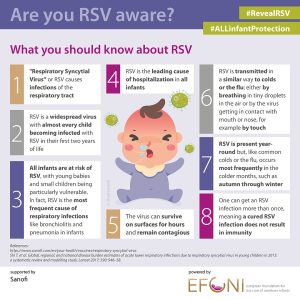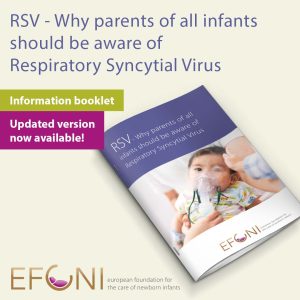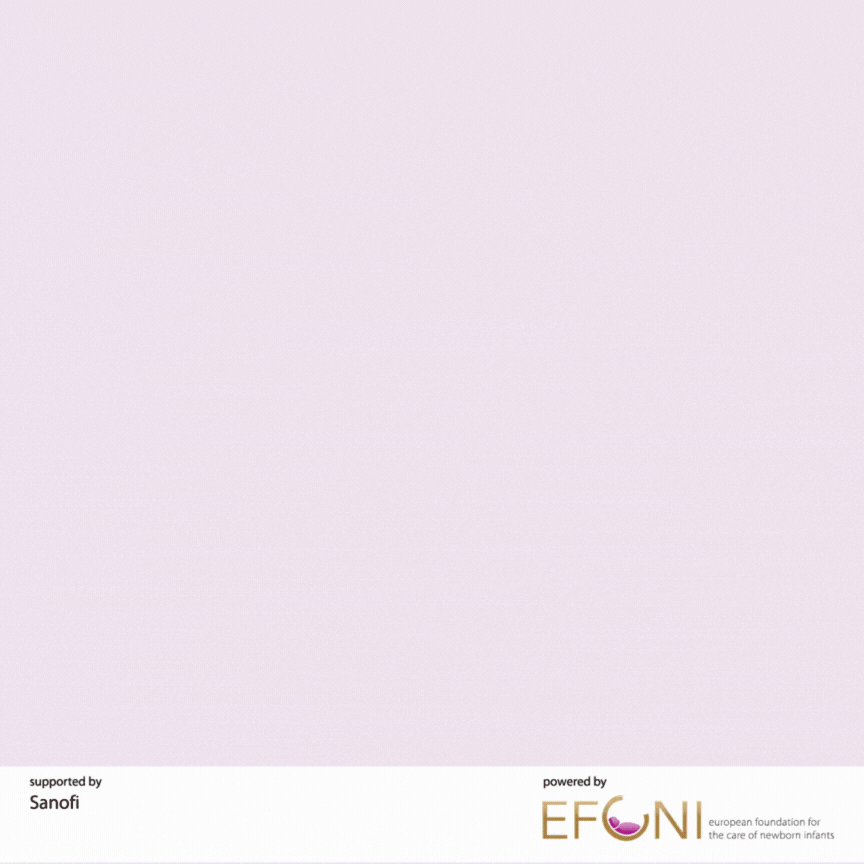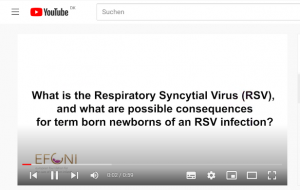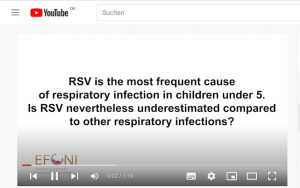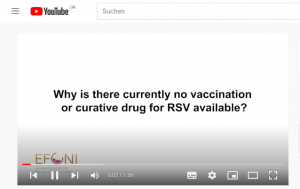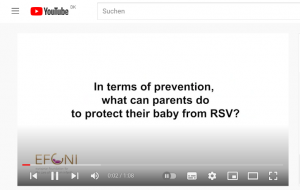The well-being of all infants is close to our hearts! They need all our help and support to grow and develop well. But even a common virus, such as Respiratory Syncytial Virus (RSV), which usually has a simple course, can lead to severe infection in all infants, including those born full-term and healthy. A severe RSV infection might even lead to persistent medical sequelae in affected children, such as wheezing. Comprehensive education about RSV is therefore essential to recognise the symptoms and warning signs of severe disease progression. First and foremost, we let affected parents have their say, sharing their personal experiences with their child’s RSV disease to inform and warn other parents.
RSV Stories – Parents’ voices about their personal RSV experiences
When it comes to the well-being of their children, parents do not compromise and have an uncanny sense of knowing when something is wrong. These parents have had their own unique experiences with their child’s RSV infection. Here they speak openly and directly about their uncertainty at diagnosis and their fears and worries when their child was admitted to hospital. Mothers and fathers report on the unpredictable course of the disease, the impact of the disease on the rest of the family and the further development of their recovered children.
In this way, they convey their own personal, honest picture of RSV and encourage others to listen to their gut feeling and take action, get educated and raise awareness about RSV.
Check out our compilation of these different RSV stories. What they all have in common is the urgent desire for comprehensive education and a sustainable preventative solution that will help protect all infants from RSV. Thank you for watching!
Every family has their own story – watch their very personal RSV experiences here:
You can find all the above RSV family stories as well as short video clips in our “RSV Stories” YouTube playlist.
Remember: Sharing is caring!
By sharing these family stories and our further information material with your friends or families and on your social networks, you are helping to create more awareness of RSV and its consequences. In this way, you can make a direct and simple contribution to improving the quality of life of all infants and their families.
Thank you for watching these personal stories and making a difference by sharing them!
All you need to know about RSV
RSV or “Respiratory Syncytial Virus” is a seasonal virus that causes diseases of the respiratory tract. Like the common flu, the virus circulates year-round, but outbreaks occur most often in the colder months, such as autumn, winter and spring in temperate countries. RSV infections are found worldwide. RSV is the most frequent cause of respiratory infections in all children and, as a result, a major cause of hospital admissions globally. In fact, about 3 million children are hospitalised each year due to RSV, 75% of whom are infants younger than one year.[1]
Transmission: RSV enters the body through the eyes, nose, or mouth. Similar to the common cold or flu, it is easily spread by tiny infected droplets in the air that are produced when an infected person sneezes or coughs. The virus also passes to others through direct contact, such as shaking hands. It can even survive on hard objects and surfaces for hours and remain contagious. That is why almost every child (approx. 90%) becomes infected with RSV in their first two years of life.[1]
Risks: All infants are at risk of RSV, with babies and small children being particularly vulnerable. Surprisingly, 80% of infants hospitalized for severe RSV cases are young babies born full-term and otherwise healthy, with no pre-existing health conditions. [2] Even though it typically appears like a common cold, RSV can have serious consequences and lead to severe bronchial and lung disease. Despite its frequency, potentially severe course and long-term consequences – such as wheezing and asthma – RSV has been a widely underrecognised disease to date.
Remember:
- Be RSV aware
- Get informed
- Share with friends and family
- Always be alert to protect your child!
RSV in a nutshell:
For more details, see our RSV parent booklet, which provides specific and understandable information about RSV and effective preventive measures to protect your child.
- Adamko DJ, Friesen M. Why does respiratory syncytial virus appear to cause asthma? Journal of Allergy and Clinical Immunology. 2021; 130(1):101-102. https://doi.org/10.1016/j.jaci.2012.05.024.
- Hall CB, et al. Respiratory Syncytial Virus-Associated Hospitalizations Among Children Less Than 24 Months of Age. Pediatrics, 132(2). https://doi.org/10.1542/peds.2013-0303
Signs: An RSV infection usually starts with well-known and often underestimated cold-like signs, including a runny nose, dry cough, decreased activity and appetite as well as a sore throat and headache.
Symptoms: RSV causes lung and airways infections that may lead to severe breathing problems. Therefore, persistent infection or a deteriorating general condition in children, especially in very young infants 6 months and younger, should rather be clarified once too much, than once too little. Watch for these serious symptoms, particularly during your baby’s first months at home:
- Persistent coughing and wheezing
- Rapid, shallow and disturbed breathing up to shortness of breath
- Bluish colour around lips and fingernails due to lack of oxygen (cyanosis)
- Spread-out nostrils and/or caved-in chest when trying to breathe
- Rising or high fever in newborns
Remember: If you see any of these severe symptoms in your child, call your doctor immediately!
RSV symptoms in a nutshell:
For more details, see our RSV parent booklet, which provides specific and understandable information about RSV and effective preventive measures to protect your child.
- https://www.cdc.gov/rsv/high-risk/infants-young-children.html
- Karron R. Respiratory Syncytial Virus Vaccines. In: Plotkin SA, Orenstein WA, Offitt PA, Edwards KM, eds. Plotkin’s Vaccines. 7th ed. Philadelphia, PA: Elsevier; 2018: 943-949.
- Øymar, K., Skjerven, H.O. & Mikalsen, I.B. Acute bronchiolitis in infants, a review. Scand J Trauma Resusc Emerg Med 22, 23 (2014). https://doi.org/10.1186/1757-7241-22-23
Everyone looks forward to cuddle a newborn or a cute toddler, but germs can be transmitted in the process. Follow these common basic hygiene precautions to help protect your baby from RSV disease:
- Avoid crowds and stay away from sick people. Close contact includes kissing or sharing eating utensils with people who have cold-like symptoms.
- Wash your hands often with soap and water for at least 20 seconds. Especially before touching your baby. If soap and water are not available, use an alcohol-based sanitiser.
- Stay home when you feel sick to stop the spread of germs. Also keep your baby away from day care if you notice cold-like symptoms in your baby.
- When coughing or sneezing, cover your mouth and nose with a tissue and throw it in the trash afterwards, or cough and sneeze in your elbow.
- Breastfeeding reduces the risk for an infection with RSV.
Remember: Spread the word, not the virus!
RSV prevention measures in a nutshell:
For more details, see our parent booklet, which provides specific and understandable information about RSV and effective preventive measures to protect your child.
Respiratory Syncytial Virus (RSV) is a highly contagious and common virus that spreads easily and can occur repeatedly. Severe RSV infections can even lead to multiple or prolonged hospitalisations in infants, which is a very exhausting and worrying time for parents. The healing phase is often accompanied by concern about re-infection. Along with some basic hygiene and distancing measures that have already proven effective during the COVID-19 pandemic, you can help protect your child from re-infection and contain the spread of the virus.
Remember: Stay vigilant and recognize the signs to protect your child from (re-)infection!
RSV re-infection protection in a nutshell:
For more details, see our parent booklet, which provides specific and understandable information about RSV and effective preventive measures to protect your child.
Parent Booklet “RSV – Why parents of all infants should be aware of Respiratory Syncytial Virus!”
It is important for parents to be informed about all aspects of their child’s health and well-being, but also about potential risks and effective preventive measures to protect their child. On that account, we have – together with experts in the field of neonatology and paediatrics, RSV and infectious diseases – created this parent booklet which provides specific and understandable information on the important yet sometimes underrecognised topic: “RSV – Why all parents of infants should be aware of Respiratory Syncytial Virus!”
This information booklet summarises what you as parents should know about RSV infection to help you take the right measures for your baby’s health: It provides you with easy-to-understand information about the common RSV and its symptoms, illustrated with helpful infographics. Valuable first-hand advice from parents and doctors shows how to recognise an infection and what you as parents can do yourself to protect your child from RSV. Download your booklet copy here and enjoy reading!
About the “Are you RSV aware” campaign
Our “Are you RSV aware” campaign is designed to raise awareness of RSV to protect all infants, especially among expecting and new parents, healthcare providers and caregivers. Join us and help spread the word about RSV to protect all infants from this serious virus! We invite you to download the material provided on this page and use it to inform your patients, share them with friends and family, and promote RSV awareness on your social media platforms, your blog or website. Please remember to credit ©EFCNI.
Please be sure to use the hashtags #ALLinfantProtection #RevealRSV when posting on social media and please tag us @efcni (@EFCNIwecare on Twitter/X) to help us find and like your posts!
#RSVawareness video
In our 4 episodes interview series on our EFCNI Youtube channel, Prof Luc Zimmermann, Professor of Paediatrics and Neonatology and Medical Director of EFCNI, presents answers to the most common questions on the Respiratory Syncytial Virus (RSV) for parents and healthcare providers:
- What is the Respiratory Syncytial Virus?
- Is RSV a frequent respiratory infection in young children?
- Why is there currently no vaccination or curative drug for RSV available?
- Which measures can prevent an RSV infection?
Watch individual #RSVawareness videos right here:
Further information
Download article “Parental knowledge of respiratory infections in preterm infants”
Download article “Promising new research findings in the field of RSV prevention”
The “Are you RSV aware” campaign was independently developed and is powered by EFCNI.

Corporate Partner:

- Li Y et al. Global, regional, and national disease burden estimates of acute lower respiratory infections due to respiratory syncytial virus in children younger than 5 years in 2019: a systematic analysis. Lancet. 2022 May 28;399(10340):2047-2064. doi: https://doi.org/10.1016/S0140-6736(22)00478-0.


